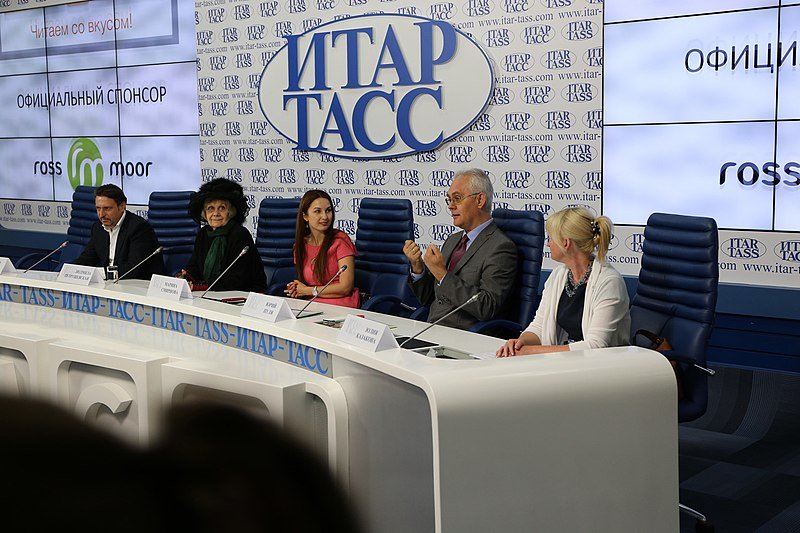How do the lies of Russian propaganda work? In recent years, Kremlin-controlled media have promoted thousands of fabricated stories, including some completely absurd narratives—e.g., about “Nazis” in Kyiv or CIA bioweapons labs across Ukraine. There has been much speculation as to whether Russians actually believe these stories but little hard evidence on the matter. One common view is that citizens are highly skeptical of propaganda and report agreement with the Kremlin’s narratives mainly because of self-censorship. Another view is that many Russians sincerely believe propaganda narratives because this is the only news they get—the truth is hard to find.
To understand how well news consumers in Russia recognize propaganda, I draw on data from several original surveys. This memo presents results from several surveys that pursued two objectives: first to understand how well news consumers in Russia recognize propaganda and second to explore how these consumers deal with critical information that goes against the narratives promoted in propaganda. The evidence reveals that Russians can distinguish between truths and falsehoods in principle, but they are much worse at it when it comes to political information. Citizens supportive of Putin—a large majority of the Russian public—are highly susceptible to propaganda messages and are put off by critical stories from independent media.
These results help us understand why the domestic reaction to the Russian army’s atrocities in Ukraine or the large scale of Russia’s losses is often so muted: not only is the Kremlin’s censorship at work, but citizens themselves resist learning politically inconvenient stories. What this means is that we have to be realistic about fighting the Kremlin’s propaganda. It is not enough to support independent media and provide Russians with accurate information, as Western governments have tried to do since the Cold War. Rather, the focus of counter-propaganda efforts should be on breaking the political and emotional link between the public and the Kremlin.
Russians Can Detect Falsehoods About as Well as Citizens of Other Countries
To measure how well Russians detect false stories, and false propaganda in particular, I conducted an online survey in the summer of 2020. I asked respondents to consider 50 headlines about politics, the economy, social issues, etc., and guess whether these messages were true or false. Some of the headlines were politically neutral or non-political. Others, taken from state media, reflected common propaganda themes such as praising Putin’s achievements or disparaging Western countries. And a third set, taken from independent media, expressed more critical views opposed to the Kremlin’s narratives.
In research on misinformation, a common measure of citizens’ ability to discern falsehoods is to compare how often, on average, they consider true stories and false stories to be true. The more often individuals believe true stories, and the less often they believe false stories, the more discerning they are. As Figure 1 shows, my Russian respondents could often distinguish between true and false messages. On average, across all headlines, respondents believed true stories 55 percent of the time and false stories only 33 percent of the time. The same was true when it came to neutral headlines. Similarly, respondents could distinguish between true and false propaganda stories and between true and false critical stories, although they believed propaganda stories slightly more often and critical stories much less often. Thus, even Russians who were active online were skeptical about critical information from independent media (I found similar results in other samples of the Russian public).
Figure 1. Russians distinguish between true and false stories fairly well

Note: Percentage of respondents who labeled news stories as true, shown separately for true and false stories. Gray dashed lines in the left-most panel show results from two analogous studies conducted in other countries. A bar below a dashed line means that Russians believed false or true stories less than their peers in other countries, and vice versa.
Source: Compiled by the author on the basis of own survey, Guess et al. 2020, and Arechar et al. 2023.
How do Russians compare to citizens of other countries? Recent large studies in the U.S. and in 16 developed and developing countries had very similar results to my study: participants believed true stories on average 57–60 percent of the time and false stories 30–32 percent of the time (in the figure, these comparisons are shown using gray dashed lines). In other words, Russians’ ability to detect falsehoods is quite average. They are not, as some research suggests, especially sophisticated news consumers, nor are they particularly more susceptible to disinformation than their peers across the world.
Kremlin Propaganda Is Often Politically Appealing
Russians are, however, much more susceptible to propaganda when it speaks to their political views and identities. Figure 2 delves into the statistics for belief in false stories shown in Figure 1, disaggregating pro-Putin and opposition-minded respondents (critics). The two groups judged politically neutral stories very similarly. This means that neither regime supporters nor critics are especially susceptible to falsehoods—nor especially discerning. But pro-Putin respondents were one-third more likely than opposition-minded Russians to believe false propaganda stories (41 percent to 31 percent).
Figure 2. Pro-Putin citizens are susceptible to propaganda but reject critical information

Note: Percentage of respondents who labeled news stories as true, disaggregating true and false stories, and opposition-minded and pro-Putin respondents. Dotted lines show the baseline results from Figure 1 (average belief in true or false stories). A bar below a dashed line means that Putin supporters or critics believed false or true stories less than the survey average, and vice versa.
Source: Compiled by the author on the basis of research.
Putin supporters were especially prone to consider true those stories with an anti-Western message. For example, 74 percent of pro-Putin respondents labeled as true the following headline: “In California, the words ‘husband,’ ‘wife,’ ‘groom,’ and ‘bride’ are banned because of same-sex marriages.”
Notably, Putin supporters believed true critical stories, which were taken from independent media, much less—almost 40 percent less often. For example, only about 15 percent of supporters believed that Putin had signed a law giving himself lifetime immunity from prosecution (this amendment to Russia’s constitution was adopted in 2020) or that in 2016–2019, the Ukrainian economy grew faster than the Russian one.
An important aspect of these findings is that my research design pushed respondents to give more accurate answers. The study was promoted as a quiz in which Russians could test their ability to recognize fake news before learning their results at the end of the quiz. In a follow-up survey (see below), I even offered monetary bonuses for correct responses. Yet despite these incentives to be more objective, respondents still fell victim to their political biases.
Putin’s popular support has consistently been high, so the pro-regime citizens in my study represent a large majority of the Russian population. I find similar susceptibility to propaganda and resistance to critical information in other surveys, too, including a nationally representative study. In other words, these results likely apply to most Russians.
Trust in State Media Increases Vulnerability
When citizens are biased toward propaganda, their media consumption exacerbates the problem. As I have shown elsewhere, Russians, especially Putin supporters, quite often trust state-controlled news outlets, which are the main vehicles of the Kremlin’s propaganda. As a result, many citizens stay in the echo chamber of propaganda. Moreover, because of this trust, Russians often see information that is attributed to state media as more reliable. When I replaced the sources of some news stories with state media outlets, pro-regime Russians were more likely to believe the messages, even though the stories themselves were unchanged.
In a follow-up survey conducted in early 2022, I asked Russians to consider 33 messages and explain their reasons for believing or disbelieving particular stories. Figure 3 shows that the reputation of the news outlet was a commonly used criterion. In theory, relying on the reputation of a news source is a healthy news consumption practice, and many popular news literacy interventions encourage it. But respondents who relied on this criterion believed pro-Kremlin falsehoods more often—their trust in state media boosted their belief in propaganda.
Figure 3. Russians rely on media reputation when judging news stories

Note: The figure shows how often, on average, respondents mentioned particular reasons for labeling news stories as true or false. Criteria related to trust in state media are in dark yellow.
Source: Compiled by the author on the basis of research.
For example, when explaining why they believed false stories published by RIA Novosti and TASS, Russia’s key state news agencies, Russians often said that these outlets were “authoritative,” “reliable,” or “vetted” (pro-Putin respondents were twice as likely to say this). Some respondents, even when they found the stories themselves implausible, still thought RIA Novosti and TASS were trustworthy. “Did TASS really publish this? Are you serious?” asked one respondent.
In contrast, when considering a story about electoral fraud published by Echo of Moscow, a prominent liberal radio station, respondents often expressed distrust: “A very biased source,” “repeatedly caught publishing lies,” “they write anything to sling mud at the government.”
Another criterion my respondents often used was outside confirmation. They labeled stories as true if they had heard these messages before or googled them and found similar statements in other sources. Again, checking for confirmation is reasonable in theory, but Russian respondents who relied on this heuristic believed false stories more often. The reason for this is that state propaganda outlets often repeat each other, with the result that citizens are more likely to find “corroboration” when searching for such stories online. Indeed, seeing that many different media organizations are telling the same story may convince even someone who is not a staunch regime supporter or does not particularly trust state media. Moreover, because of this cognitive heuristic, true critical information appears less plausible, as critical stories rarely gain visibility in Russia’s skewed media environment.
Conclusion
My research suggests that we should not expect Russians to accept the truth about Russia’s war on Ukraine any time soon. Although Russians can distinguish between true and false news information in principle, many citizens are quite susceptible to Kremlin propaganda and shield themselves from independent, critical news reporting. Only a small minority of critically minded citizens actively resist propaganda and seek alternative information.
Even when pro-Putin Russians hear about the atrocities their country commits in Ukraine or the Russian army’s heavy losses, many of them dismiss such stories as fabrications or interpret them in their own way. Sometimes, propaganda steps in and offers helpful explanations that citizens can use to reconcile the reality of war with their existing worldviews. After a Russian rocket struck a historic cathedral in Odesa in July 2023, state television hastened to explain that the videos of the explosion pointed to “inept” work by Ukrainian air defense and to declare that if Russia had wanted to attack the cathedral, it would have completely obliterated it using its “precision” weapons.
Even if the Russian media environment were to be magically transformed overnight and independent, critical reporting were somehow to become widespread, many Russians would still avoid or reject such truths (just as many Americans believe that the 2020 election was fraudulent, despite all evidence to the contrary). Piercing this bubble is even more difficult with the propaganda apparatus in full swing, and efforts to increase awareness about the war are unlikely to be effective.
As such, Western counter-propaganda efforts should focus not on providing accurate information, but on breaking the political and emotional bond between the Kremlin and the Russian public. Helping Ukraine win the war may be one way to do this. Modeling communications with ordinary Russians on the practices of communication across partisan lines might also help. But ultimately, the lesson is that even in autocracies with extensive censorship and propaganda machines, much of what citizens learn and believe about the world is driven by their own choices and identities.
Anton Shirikov is a Postdoctoral Scholar in Russian Politics at the Harriman Institute, Columbia University.










